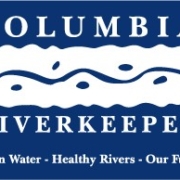Ninth Circuit Court: EPA Broke the Law, Must Plan to Reduce Columbia and Snake River Temperatures
EPA must protect Columbia Basin salmon and steelhead from dangerously warm river temperatures

December 20, 2019 (Seattle, WA)—Today, the Ninth Circuit Court of Appeals ruled in favor of conservation and trade groups and ordered the U.S. Environmental Protection Agency (EPA) to protect Columbia basin salmon and steelhead from dangerously warm river temperatures. Warm water, caused by large, shallow reservoirs and intensifying climate change, threatens the Columbia and Snake rivers’ already imperiled salmon and steelhead.
The lawsuit was sparked by record-high water temperatures in recent years, including an incident in 2015 where 250,000 adult sockeye salmon died when the Columbia and Snake rivers became too warm. This year, hot water in the lower Snake River again killed many endangered Snake River sockeye.
Columbia Riverkeeper, Snake River Waterkeeper, Idaho Rivers United, Pacific Coast Federation of Fishermen’s Associations, and the Institute for Fisheries Resources brought the suit. The court found that EPA has failed to undertake its mandatory duty to issue a temperature TMDL, stating: “The time has come–EPA must do so now.” The temperature TMDL, or Total Maximum Daily Load, is a Clean Water Act pollution plan designed to protect salmon from hot water in the Columbia and Snake rivers.
“Because of today’s victory, EPA will finally write a comprehensive plan to deal with dams’ impacts on water temperature and salmon survival,” said Brett VandenHeuvel, Executive Director of Columbia Riverkeeper.
“Our members’ livelihoods depend on healthy salmon runs,” said Glen Spain, Northwest Regional Director of the Pacific Coast Federation of Fishermen’s Associations and the Institute for Fisheries Resources. “It’s simply unacceptable to let hot water kill otherwise-healthy adult salmon before they can spawn. We’re glad EPA will finally do its job.”
“Hot water in the lower Snake and Columbia rivers has been a year-in, year-out problem for endangered salmon,” said Nic Nelson, Executive Director of Idaho Rivers United. “This victory will create more protections for endangered species that are an indelible part of our northwest way of life, culture, economy, and heritage.”
“This decision represents a clear victory for critically endangered salmon and steelhead populations” said Snake River Waterkeeper Buck Ryan. “EPA must now act to protect what remains of the once-magnificent anadromous fisheries on the Snake, Clearwater, and Salmon rivers by ensuring water temperatures stay cool enough to allow passage for spawning.
Columbia Riverkeeper, Snake River Waterkeeper, Idaho Rivers United, Pacific Coast Federation of Fishermen’s Associations, and the Institute for Fisheries Resources are represented by the law firm Advocates for the West. Advocates for the West litigates to protect western public lands, waters, and wildlife.
For more information, visit columbiariverkeeper.org, snakeriverwaterkeeper.org, idahorivers.org, pcffa.org, ifrfish.org, and advocateswest.org.
###
Resources:
- Ninth Circuit Opinion
- Video of Ninth Circuit Oral Arguments in this Case
- District Judge Orders EPA to Protect Columbia Basin Salmon, October 17, 2018
- Photos of 2015 sockeye salmon die-off
Background:
The Clean Water Act bans Columbia River temperatures over 68 degrees Fahrenheit. When water temperatures reach the 70s, salmon die. In 2003, EPA studied the causes of hot water in the Columbia and Snake rivers and began developing a legally enforceable plan to fix the problem. But dam operators objected and the plan was shelved. Why? EPA found that dams are the main cause of temperature problems. Thanks to today’s ruling, EPA will have to put that plan into action and protect salmon.
What is the law?
The Clean Water Act prohibits temperature in the Columbia River from exceeding 68 degrees. The Endangered Species Act is designed to protect critically imperiled species from extinction. But the government agencies in charge of the Columbia and Snake river dams aren’t obeying the law. Today’s ruling establishes that EPA is legally obligated to write a plan to bring the rivers’ temperature back in line with the needs of salmon—and the requirements of the Clean Water Act.




Leave a Reply
Want to join the discussion?Feel free to contribute!